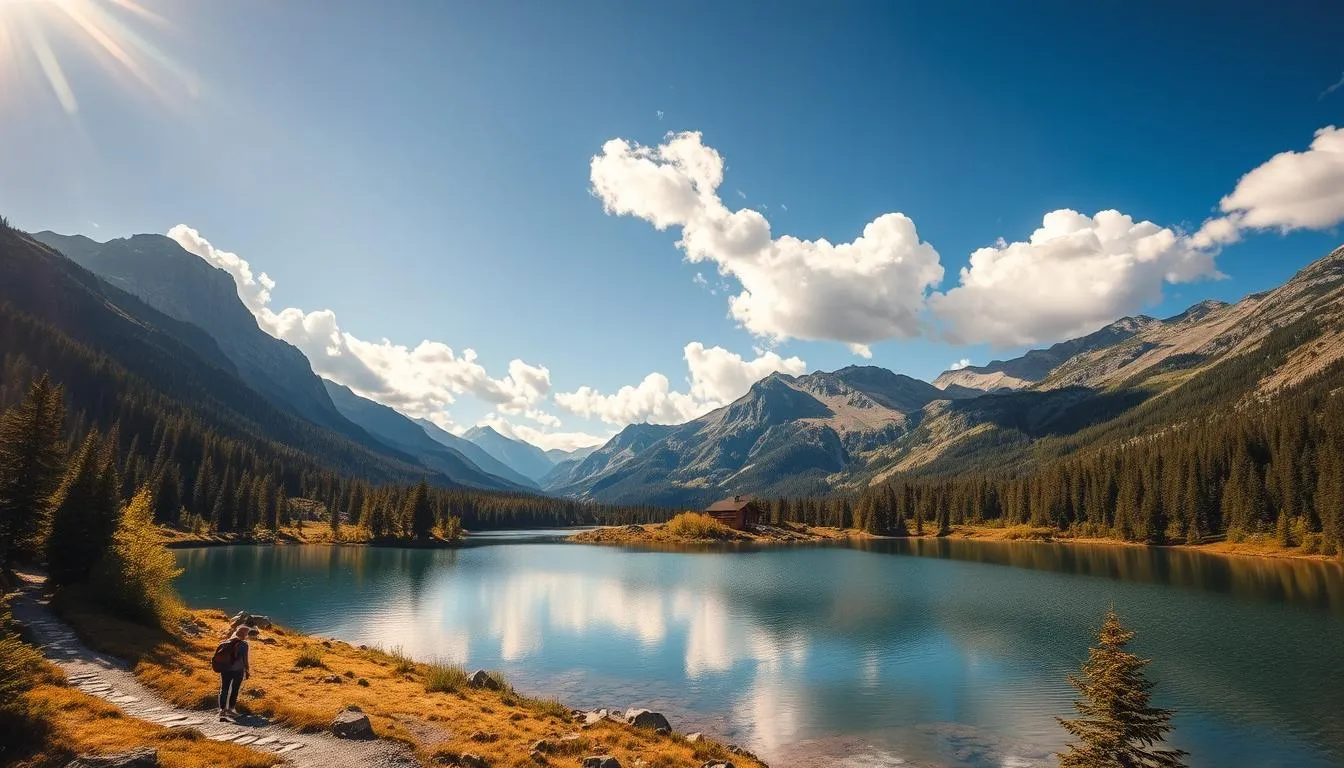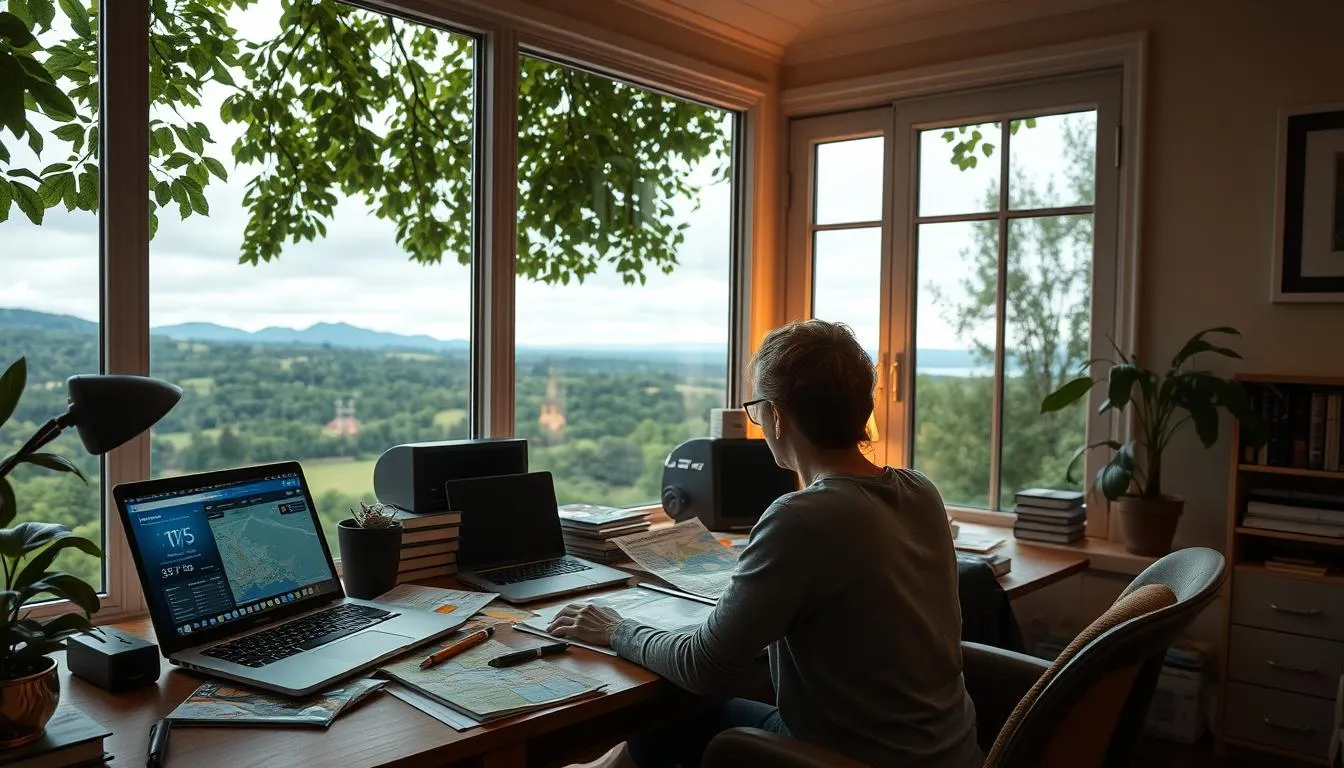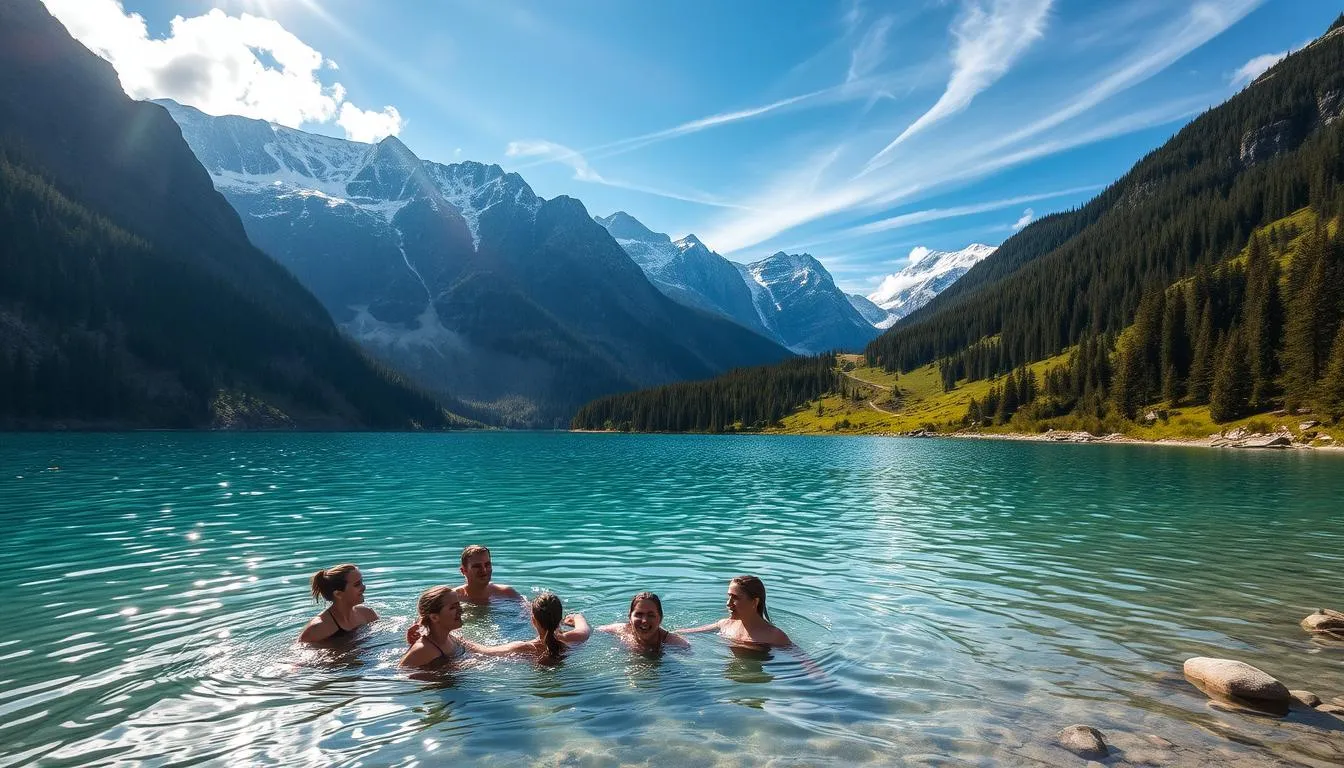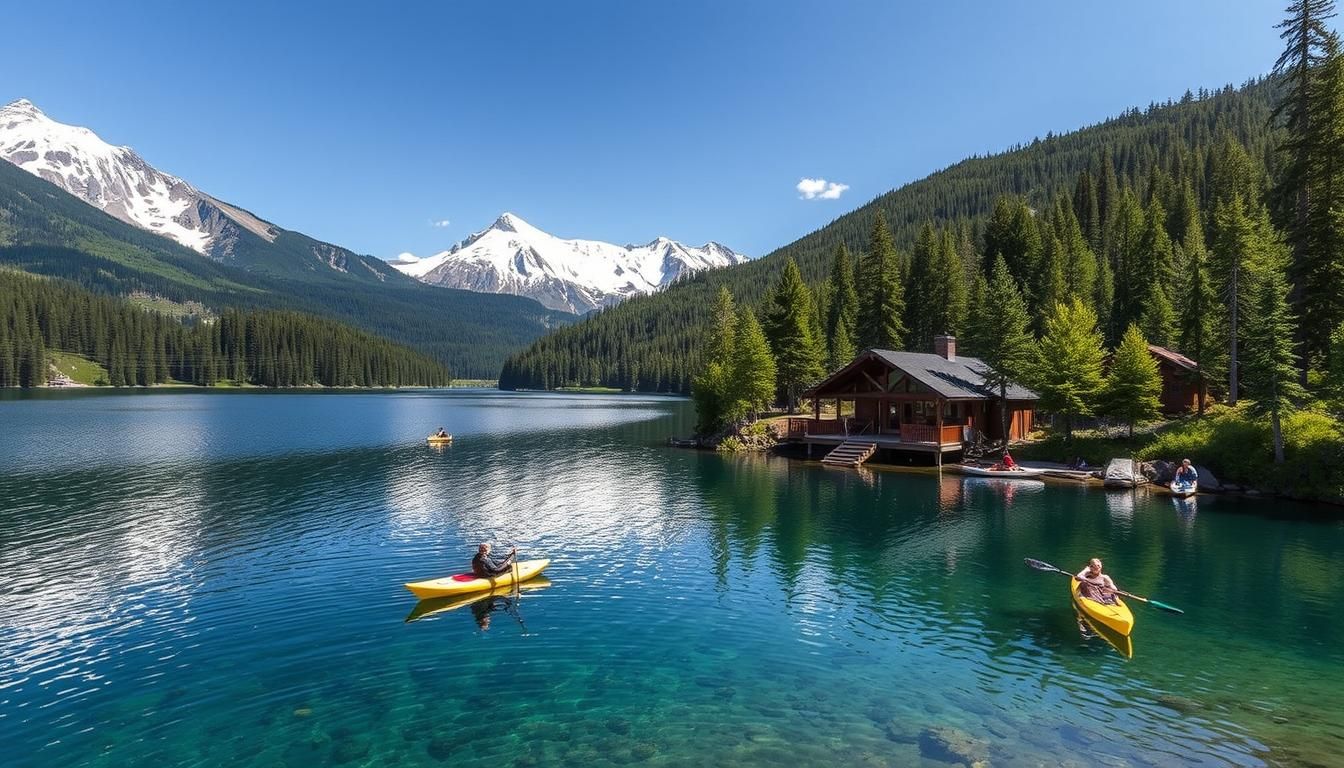Nearly 70% of U.S. travelers say they prefer cooler summer spots to avoid extreme heat, making coolcations one of the fastest-growing travel trends this year.
Think long days, fresh air, and cities that invite walking instead of hiding indoors. This guide explains why a temperate getaway makes summer more enjoyable and less stressful for both the body and the budget.
We’ll cover what a coolcation is, the practical reasons behind the trend, and how to plan around daylight and temperatures. Expect clear tips on what to pack, when to go, and how to find peaceful cities and wild places that stay comfortable during peak summer.
This traveler-first resource blends inspiration with specifics so you can turn ideas into a ready-to-book plan fast. Browse curated spots from coastal cities to mountain escapes and learn sample experiences that spark your itinerary.
Key Takeaways
- Coolcations prioritize comfort, wellbeing, and smarter summer spending.
- Temperate destinations make outdoor exploring easier in cities and wilderness.
- Plan by temperatures and daylight to avoid crowds and long lines.
- Pack light layers and sun-smart gear for variable climates.
- Find ideas and destinations in this guide and on trusted sources like summer destinations with cooler weather.
What Are Coolcations and Why This Travel Trend Is Heating Up
When summer turns extreme, some travelers choose destinations with steady, comfortable temperatures — that’s a coolcation. A coolcation is a trip to a place with a cooler or temperate climate, planned so you can enjoy long daylight hours without sweltering afternoons. It’s about swapping heat for easy, breezy exploring by day and cozy evenings.
From prediction to momentum
Late in 2023 Condé Nast Traveler named this idea a rising travel trend, and 2024 proved the forecast right. A Virtuoso survey found 82% of clients were interested in taking a coolcation this year.
Bookings reflect the shift: Scandinavia is up 27% and Sweden bookings rose 47%, showing demand around the world as travelers seek relief from record heat and recurring heat waves.
What draws people north (or to higher ground)
Balanced temperatures, longer daylight in prime months, and outdoor-friendly cities and wild places make these destinations appealing. You can linger at cafés, walk parks, and sightsee without overheating.
Whether you prefer compact coastal cities or wide-open landscapes, the reasons to try this trend go beyond comfort: it’s also a chance to discover new destinations and plan smarter summer trips. Practical tips and vetted spots follow in the next sections.
How Coolcations Help You Beat the Heat and Crowds
A wisely chosen summer trip can swap stifling afternoons for breezy walks and calm waterfronts. Last year was the hottest on record and 2024 began warm, so many travelers now favor temperate spots to avoid intense heat waves.
Escaping record heat waves while still enjoying sun, sea, and sights
A coolcation lets you keep the best parts of summer: bright evenings, time by the water, and relaxed sightseeing without feeling drained. In places like the Nordics, Scotland, or Canada you can swim, dine outdoors, and explore without constant breaks to escape the sun.
Fewer crowds, better value, and supporting destinations beyond tourist hotspots
Choosing less obvious destinations often means fewer crowds, shorter lines, and more space to connect with local culture. That brings better availability, calmer service, and a slower pace to enjoy sights.
- Beat heat while keeping seaside evenings and outdoor dining.
- Replace “hide from the sun” afternoons with energizing waterfront walks.
- Shift spending away from overburdened tourist neighborhoods to support regional businesses.
| Overheated Southern Europe | Temperate Coolcation | Benefit |
|---|---|---|
| Midday temperatures often exceed comfort | Steady, mild afternoons | Full-day outdoor plans |
| Large crowds at peak sites | Fewer crowds and shorter lines | Better value and calmer service |
| Tourist zones stressed by high volume | Local neighborhoods benefit from visitors | More authentic experiences |

Planning Your Coolcation: When to Go, What to Pack, and How to Stay Weather‑Smart
With a little strategy, you can enjoy extended daylight while staying comfortable and flexible on the road. Use daylight to shape the best parts of each day and leave bad-weather hours for indoor plans.
Best time of day and seasonality
Plan big hikes and city walks for the brightest time of day. Save museums, markets, and long meals for later when golden hours stretch on.
Temperate regions show variable climates by months. Shoulder seasons often mean milder temperatures, fewer crowds, and still-summery vibes.
Smart packing for mountains, fjords, beaches, and cities
Pack light layers: breathable base layers, a warm midlayer, and a packable rain shell. Add sturdy shoes and quick-dry pieces that work in mountains and by the beach.
Extras to tuck in: compact umbrella, swimwear for thermal pools or coastal dips, and a small dry bag for boat days. For city stays, many hotels link to transit and bike share—bring a lightweight daypack and comfy walking shoes.
Stay vigilant: monitor forecasts and travel risk alerts
Spikes in temperatures, wildfires, or storms can occur even in cooler climates. Check forecasts for your trip regularly and build an indoor backup plan.
Tip: Use TripIt’s in-app forecast and TripIt Pro Risk Alerts to get notified of sudden weather events and reroute your trip if needed.
| Issue | How to plan | Quick benefit |
|---|---|---|
| Long daylight | Schedule outdoor excursions midday; save dining for evening light | Maximize scenic time and avoid heat peaks |
| Variable temperatures | Layered clothing and quick-dry fabrics | Comfort across mornings and late nights |
| Sudden weather or risks | Use TripIt alerts and local advisories | Faster reroutes and safer trip decisions |
| City logistics | Choose hotels near transit; pack light daypack | Easy pivots if weather forces plan changes |

Top Coolcation Destinations in the World Right Now
From rugged highlands to midnight-sun coastlines, these top coolcation destinations deliver fresh air and big scenery. Pick a place that matches your pace—city strolls, mountain hikes, or quiet water views.
Scotland
Highlands hikes, whisky, and wildlife. Weather can shift fast—locals joke about four seasons in a day—so pack layers for hillwalks and distillery tours.
Iceland
Expect waterfalls, black sand beaches, geysers, and glaciers. Reykjavík is compact and walkable, perfect for coffee stops between touring dramatic sights.
Denmark
Copenhagen is famously bike-friendly. Families love Tivoli Gardens and the Zoo, while parks and calm waterways invite kayaking and SUP.
Finland
Helsinki blends saunas, city bikes, and ferry trips to Suomenlinna. Head north for Lapland’s national park trails, Midnight Sun hikes, and seasonal Northern Lights.
Faroe Islands
These volcanic islands boast fjords, cliffs, and superb birding. The Faroe Islands suit travelers who want dramatic views and quiet trails off the usual routes.
Canada
Vast national parks, glaciers, ice fields, and hot springs pair with lively cities like Toronto, Montreal, Vancouver, and Halifax for strong food and cultural scenes.
Alaska, USA
The Last Frontier offers wildlife-rich cruises, mountain trails, and guided kayak days. Plan for whale watching, fishing, and long summer light on the water.
“Use these destinations to match your style: city-curious, trail-focused, or craving water views—there’s an adventure-ready place for every tour.”
| Destination | Highlights | Best for |
|---|---|---|
| Scotland | Highlands, distilleries, wildlife | Hiking, food, culture |
| Iceland | Waterfalls, black sand, glaciers | Photography, hot springs |
| Denmark | Copenhagen bikes, parks, waterways | Family trips, cycling |
| Finland | Saunas, Lapland parks, Midnight Sun | Nature + city balance |
| Faroe Islands | Fjords, cliffs, birding | Remote hiking, off‑beat adventure |

- Match the destination to the experience you want: cities for food and museums, parks for wildlife and mountains, coasts for beaches and water tours.
- Plan flexible days for variable weather and include indoor options in your itinerary.
Coolcations Itineraries and Experiences to Try This Year
Plan sample itineraries that pair gentle days in town with bold outdoor moments for a truly refreshing summer escape. These routes help you build a trip that balances sightseeing, wildlife viewing, and relaxed meals by the water.
Canadian Rockies by train: Banff, Lake Louise, and Vancouver
Ride the rails through the Canadian Rockies on a signature tour linking Banff, Lake Louise, and Vancouver. Expect turquoise glacial lakes, emerald peaks, and wildflower meadows in summer.
A traveler from Texas reported leaving 105°F behind for Calgary’s cool air and enjoying wildlife spotting, snowcapped mountains, and aqua lakes en route to national parks and glaciers. Highlights include an Ice Cat ride and a short guided glacier walk.
Nordic city-to-nature getaway: Copenhagen or Helsinki plus day trips
Base in Copenhagen or Helsinki, then add coastal and forest day trips. Bike through compact neighborhoods in the morning, visit markets or museums, and spend afternoons on island ferries or forest trails.
This formula keeps days flexible: morning culture, afternoon water or woods, and golden-hour dinners by the harbor where waves set the mood.
Fjord-focused tour: kayaking, hiking, and scenic drives
Design a fjords-focused tour in Iceland or the Faroe Islands with calm-water kayaking, cliff hikes, and drives that connect waterfalls, lookouts, and windswept sand beaches.
Balance active days with restful food stops and easy evenings. Arrange transfers and timed entries so logistics don’t interrupt the adventure.
- Tip: Build in bucket-list activities—wildlife cruises, Ice Cat rides, or glacier walks—then relax on a narrated sightseeing train or harbor-side dinner.
- Tip: Use this framework as a plug-and-play coolcation itinerary and swap activities to match your pace.
- Want more ideas? See a curated coolcation destinations list for added inspiration.
| Itinerary | Key experiences | Best for |
|---|---|---|
| Canadian Rockies by train | Scenic rail, glacier walk, Ice Cat ride, wildlife viewing | Photography, national park hikes, mountain views |
| Nordic city + nature | City biking, island ferries, forest trails, waterfront dining | Culture + easy outdoor days, food and sea views |
| Fjord-focused tour | Kayaking, cliff hikes, scenic drives, windswept beaches | Adventure, fjords, remote viewpoints |
Conclusion
Pick a temperate hub this summer and watch long daylight hours turn into active, low‑stress days. Coolcations are more than a short buzz — this travel trend helps you enjoy summer while you beat heat and keep energy high.
Temperate temperatures and steady daylight let you plan fuller days. From compact city breaks to mountain trails or coastal beaches, the destinations and places here give you options for every taste.
Book key hotels early, then layer in flexible activities so you can pivot with weather and still see plenty. Choose a single city as your home base and branch out to parks, harbors, and short hikes for easy logistics.
Whether you want coastal cafés, soft sand walks, or crisp ferry rides, a coolcation trip can make this summer calmer and more rewarding.
FAQ
What is a coolcation and why are travelers choosing them?
A coolcation is a temperate-climate getaway designed to beat summer heat while still offering beach, mountain, city, or wildlife experiences. Travelers pick these trips to enjoy milder temperatures, fewer crowds, better value, and natural sights without sweltering in heat waves.
Are coolcations a new trend or rooted in recent travel data?
The idea gained mainstream attention after Condé Nast highlighted it in 2023, and surveys and booking patterns in 2024 show growing interest — with strong demand for Scandinavian and North Atlantic destinations like Sweden, Iceland, and the Faroe Islands.
Which months are best for a coolcation?
Summer months (June–August) usually offer the mildest conditions in high-latitude spots, with long daylight for outdoor activities. Shoulder seasons (May and September) deliver fewer crowds, lower prices, and comfortable weather in many destinations.
How do coolcations help avoid crowds and high prices?
Choosing temperate or off-peak destinations spreads tourist flows away from overheated hotspots. Many coolcation spots — national parks, fjords, smaller cities — see fewer visitors, which often means better hotel rates, easier reservations, and a calmer experience.
What should I pack for a coolcation that mixes mountains, coast, and cities?
Pack layers: a waterproof jacket, light insulated midlayer, quick-dry shirts, sturdy shoes for hikes and city streets, swimwear for cool beaches or hot springs, and a compact daypack. Don’t forget sunscreen, a reusable water bottle, and a warm hat for chilly evenings.
How can I stay weather‑smart during my trip?
Monitor local forecasts and travel alerts, sign up for hotel or tour notifications, and build flexible plans. In mountain and coastal regions, weather can change fast — plan shorter outdoor activities early in the day and have indoor alternatives like museums or food tours.
Which destinations deliver the best mix of nature and city life for a coolcation?
Iceland and Reykjavík combine glaciers, waterfalls, and urban culture. Scotland offers Highlands hikes, whisky distilleries, and compact cities like Edinburgh. Copenhagen and Helsinki pair city biking and cafes with easy access to coastal and forest day trips.
Are there family-friendly coolcation options?
Yes. Denmark’s parks and waterways suit families, as do parts of Canada — Banff and Lake Louise offer kid-friendly trails and gondolas. Many Nordic cities provide family-focused museums, bike rentals, and calm beaches or lakes.
Can I include wildlife viewing on a coolcation?
Absolutely. Alaska and parts of Canada are prime for bears, whales, and birding. Iceland and the Faroe Islands offer seabird colonies and marine life. Booking guided tours increases your chances of responsible, high-quality wildlife encounters.
How do I get around during a coolcation — rental car, train, or flights?
It depends on the route. Trains and ferries work well in Canada and parts of Scandinavia for scenic travel. Rental cars give flexibility for fjord roads and remote parks. For longer distances, short domestic flights can save time; combine modes for best results.
What experiences should I try this year for an unforgettable coolcation?
Consider a Canadian Rockies train journey through Banff and Lake Louise, a Nordic city-to-nature split with Copenhagen plus coastal day trips, or a fjord-focused tour in Iceland or the Faroe Islands for kayaking, hiking, and dramatic scenery.
How do coolcations support local communities and sustainable travel?
Visiting less-crowded destinations spreads tourism revenue to smaller towns, supports local guides, hotels, and restaurants, and reduces pressure on overvisited sites. Choose responsible operators, use public transport where possible, and respect local wildlife and habitats.
